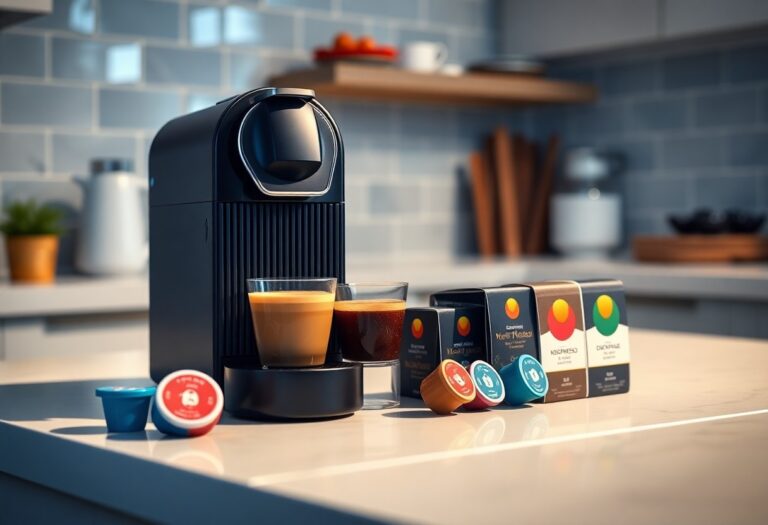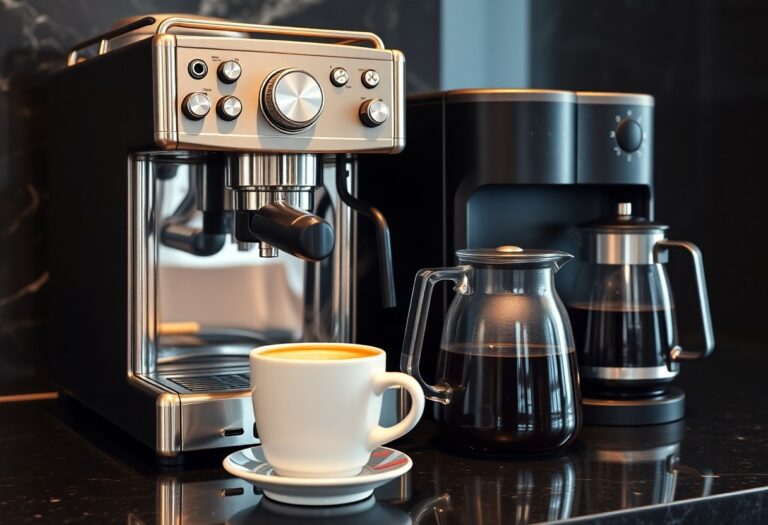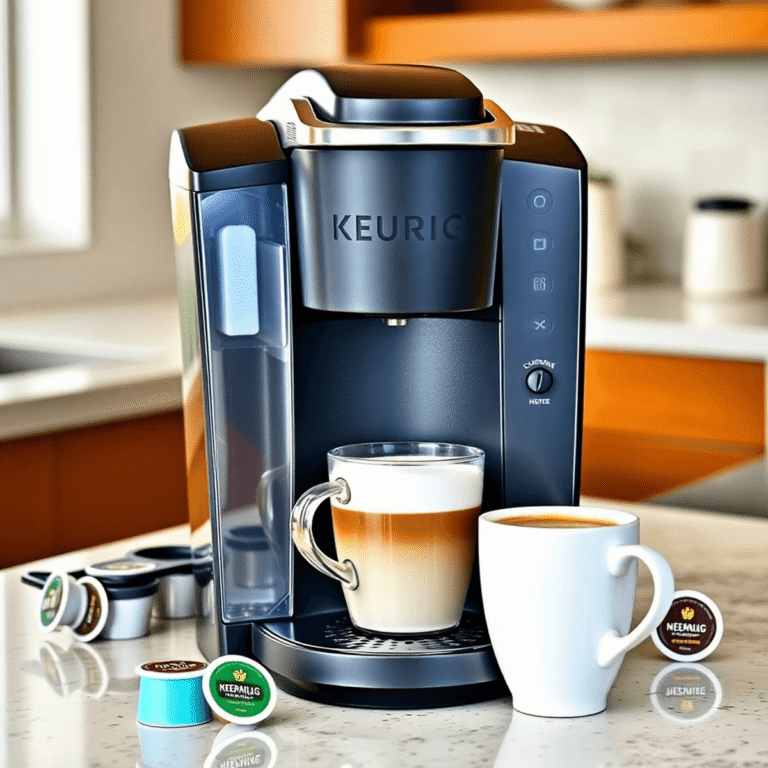What Can I Use to Clean a Coffee Machine – Cleaning Solutions
There’s a variety of effective cleaning solutions you can use to maintain your coffee machine and ensure it brews the best-tasting coffee. From natural ingredients like vinegar and baking soda to specialized descaling agents, each option has its advantages in removing mineral buildup and coffee residue. Cleaning your coffee machine not only enhances your beverage’s flavor but also prolongs the life of your appliance. Stay away from harsh chemicals that could damage your machine, and explore safe, efficient cleaning alternatives that will keep your coffee experience at its best.

Key Takeaways:
- Vinegar and water solution is an effective natural cleaner for descaling coffee machines.
- Choose commercial coffee machine cleaners specifically designed for your machine type for optimal results.
- Regular cleaning of removable parts, like the carafe and filters, helps maintain coffee quality and hygiene.
- Always refer to the manufacturer’s instructions when selecting cleaning solutions to avoid damaging the machine.
- Use a soft cloth or sponge when cleaning exterior surfaces to prevent scratches and maintain appearance.
Decoding the Coffee Machine Components That Need Cleaning
Understanding the components of your coffee machine is crucial for effective maintenance. Regular cleaning focuses primarily on the brew group, water reservoir, and any filters. Neglecting these areas can lead to the accumulation of coffee oils and minerals that compromise both flavor and functionality. For effective natural cleaning solutions, you can explore what are some good natural cleaners for coffee machines?
The Brew System: Where Flavor Meets Function
Your coffee machine’s brew system is the heart of its function, extracting rich flavors from coffee grounds. Cleaning this area should involve removing any residue or oils built up over time. Regularly rinsing the brew group with warm water ensures consistent taste and prevents any burnt or bitter notes from tainting your brew.
Water Reservoirs and Their Role in Maintenance
Water reservoirs are a common area for mineral buildup, particularly if you use hard water. They’re easy to overlook but require frequent cleaning to ensure your machine operates effectively. It’s advisable to empty and rinse them regularly, checking for any mold or mildew growth, which can compromise the hygiene of your coffee.
Neglecting your water reservoir can lead to issues such as clogged water lines and bitter tasting coffee. Periodic cleaning with a solution of water and vinegar not only eliminates mineral deposits but also helps prevent any unpleasant odors. A general goal should be to rinse the reservoir after every few uses and do a more thorough clean at least once a month to keep it in optimal condition.
Homemade Cleaning Solutions That Pack a Punch
Your kitchen has hidden gems that can help keep your coffee machine in tip-top shape. Homemade cleaning solutions not only save you money but can also be just as effective as commercial cleaners. Easy to whip up, these solutions harness the power of everyday household items to tackle the buildup of coffee oils and limescale while providing a fresh brew every time.
Vinegar and Water: The Traditional Method
Mixing equal parts vinegar and water creates a simple yet effective solution that has stood the test of time. Run this mixture through your coffee machine, letting it descale and cleanse without harsh chemicals. Finish by running a couple of cycles with plain water to remove any residual vinegar taste.
Baking Soda: Gentle Yet Effective
Baking soda acts as a gentle abrasive that can effectively deodorize and clean your coffee machine. Combine a few tablespoons of baking soda with warm water, creating a paste that can be used to scrub internal components. Its mild abrasive properties work wonders on stubborn stains without damaging your machine.
To use baking soda effectively, dissolve about two tablespoons in one cup of warm water for a thorough internal clean. Pour this mixture into the water reservoir and run a brew cycle, allowing the baking soda to break down oils and contaminants. Follow up with a few cycles of clean water to ensure all residues are washed away, leaving your machine fresh without any chemical aftertaste. This method not only cleans but also neutralizes odors, making every cup a pleasure to sip.

Commercial Products Worth Your Investment
Investing in quality commercial cleaning products can greatly enhance your coffee machine maintenance routine. These products are designed specifically to tackle the mineral build-up and residue that home remedies might struggle with. Look for options that are proven to be effective without damaging your machine. Brands like Urnex and Dezcal offer reliable solutions which can save you time and hassle in the long run.
Specialized Descalers: What to Look For
Opt for specialized descalers that are safe and effective for your specific coffee machine type. Look for formulas that contain citric acid or sulfamic acid, as they help dissolve limescale while remaining gentle on internal components. Always check for compatibility with your machine to avoid any potential issues.
Cleaning Tablets: The Convenience Factor
Cleaning tablets are a convenient way to maintain your coffee machine’s cleanliness without the fuss. These pre-measured tablets simplify the cleaning process, allowing you to achieve optimal results with minimal effort.
Instead of measuring and mixing solutions, just drop a cleaning tablet into your machine’s reservoir and follow the instructions. This straightforward method ensures that you’re using the correct dosage every time, which is especially helpful for busy coffee enthusiasts. Brands such as Keurig and Breville often provide their own tablets, which are tailored to work seamlessly with their machines while effectively removing oils and residues that build up over time.
The Art of Routine Maintenance for Longevity
Maintaining your coffee machine isn’t merely about cleaning; it’s an ongoing commitment that enhances the longevity and performance of your appliance. Establishing a regular maintenance routine ensures that you avoid many common pitfalls, such as buildup of coffee oils or mineral deposits. By being proactive, you can enjoy better-tasting coffee and reduce the risk of mechanical issues down the line.
Daily Cleaning Habits to Adopt
Incorporating daily cleaning habits is necessary for optimal coffee machine performance. After each use, ensure you empty the coffee grounds and rinse the brew basket to prevent lingering odors. Wipe down the exterior with a damp cloth to remove any coffee splatters, and don’t forget to clean the water reservoir regularly to avoid mold buildup.
Deep Cleaning: Frequency and Best Practices
Deep cleaning your coffee machine should be done every three months to maintain its performance and flavor integrity. This process involves descaling with a suitable solution, such as vinegar, and ensuring every part, including the removable components, is thoroughly sanitised. Skipping this step can lead to unwanted mineral deposits and poor brew quality.
During deep cleaning, take extra care with the internal components. Begin by running a mixture of equal parts water and vinegar through the machine to break down mineral buildup. Follow up with multiple cycles of clean water to ensure all vinegar residue is removed. Disassemble any removable parts for a thorough wash—make use of a soft brush to scrub away stubborn coffee oils. Adhering to this practice every few months will enhance your coffee machine’s performance and lifespan significantly, ensuring each cup of coffee is consistently delicious.
The Impact of Regular Cleaning on Your Brew Quality
Regular cleaning significantly enhances your brew quality, ensuring every cup of coffee bursts with flavor. Over time, minerals, oils, and residue accumulate within your coffee machine, leading to stale, bitter brews. By incorporating routine maintenance into your schedule, you can extract the freshest flavors from your beans. For expert tips on how to clean your machine, check out this resource on How to Clean a Coffee Maker for a Better Tasting Cup of Joe.
Taste Test: Before and After Cleaning
Consider conducting a simple taste test before and after you clean your coffee machine. The difference is startling; grimy machines produce coffee that lacks clarity and vibrancy, while a clean machine draws out the full spectrum of flavors. You’ll likely find notes that were previously overshadowed by leftover oils and mineral buildup, highlighting how important maintenance is in preserving coffee integrity.
How Clean Machines Save Money Long-Term
Investing time in cleaning your coffee machine equates to savings on coffee costs in the long run. A dirty machine not only produces subpar coffee but can lead to equipment malfunctions, resulting in costly repairs or replacements. Moreover, by ensuring optimal performance through regular cleaning, you’ll reduce the frequency of part replacements, enhancing machine longevity.
Extending your coffee machine’s life through consistent cleaning helps prevent expensive breakdowns, which can drain your budget. For instance, mineral buildup can cause necessary components like heaters to work harder, leading to overheating and eventual failure. By committing to a regime that emphasizes cleanliness, you both maintain flavor integrity and avoid unnecessary replacement costs, ensuring that your beloved coffee maker serves you delicious brews for years to come.
Summing up
Ultimately, your coffee machine deserves regular cleaning to ensure it brews delicious coffee. You can use a variety of solutions including vinegar, baking soda, or specialized coffee machine cleaners. Each method has its benefits, depending on how often you clean and the type of residue you’re dealing with. Regular maintenance not only improves the taste of your coffee but also extends the life of your machine. Choose the cleaning solution that suits your needs best, and enjoy aromatic coffee every time you brew.
FAQ
Q: What is the best way to clean a coffee machine?
A: The best way to clean a coffee machine involves a few steps. Start by emptying the coffee pot and removing any used coffee filters. Rinse the carafe and filter basket with warm water. For a deeper clean, you can use a mixture of water and white vinegar (1:1 ratio) to run through the machine. This solution helps to remove mineral buildup. After running the vinegar solution through the machine, follow up with two cycles of plain water to thoroughly rinse out any vinegar residue.
Q: Can I use baking soda to clean my coffee machine?
A: Yes, baking soda can be an effective cleaning solution for your coffee machine. Make a paste by mixing baking soda with a little water, and apply it to the carafe and filter basket. Let it sit for about 15-20 minutes for the best results, then scrub gently before rinsing thoroughly. Baking soda is excellent for removing stains and odors without leaving a harsh chemical residue.
Q: How often should I clean my coffee machine?
A: It is generally advisable to clean your coffee machine every 1-3 months, depending on usage. If you frequently brew coffee or use hard water, consider cleaning it more often to prevent mineral buildup and ensure optimal performance. Regular maintenance not only keeps your machine running smoothly but also enhances the taste of your coffee.
Q: Are there any commercial cleaning products recommended for coffee machines?
A: Yes, there are several commercial cleaning products specifically designed for coffee machines. Look for products that contain descaling agents, which effectively remove mineral buildup from the interior components. Be sure to follow the manufacturer’s instructions for use and rinsing to ensure the safety of your machine and to maintain its performance. Popular brands include Urnex and Dezcal.
Q: Can I use bleach to clean my coffee machine?
A: It is not advisable to use bleach to clean your coffee machine, as it can leave harmful residues that are difficult to rinse out entirely. Instead, opt for natural cleaning solutions such as vinegar or citric acid, which are safer for both your health and your machine’s components. Always ensure that any cleaning solution you use maintains the flavor integrity of your coffee.







